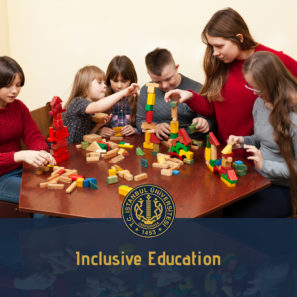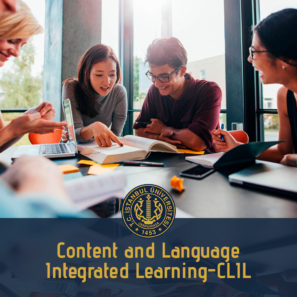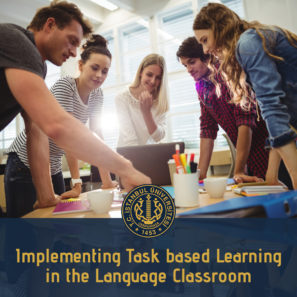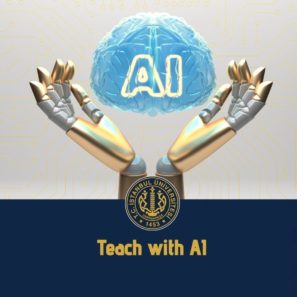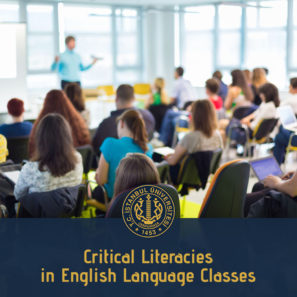Preparatıon:
This course requires and invites the participants to actively participate in exploration and practice activities both individually and in groups. The exchange of information, opinions and practices during the course will help language teachers design personally developed skills-based courses in their actual language teaching environments. The participants might find it useful to read some of the below listed reading material before joining the training:
- Lynch, T. & Anderson, K. (2012). Effective English learning. English Language Teaching Centre, University of Edinburgh.
- Carter, R. & Nunan, D. (Eds.) (2001) The Cambridge guide to teaching English to speakers of other languages. Cambridge: Cambridge University Press.
- Graham, S. (2019). Changing how writing is taught. Review of Research in Education, 43 (1), 277-303.
- Nation, I. S. P. (2009). Teaching ESL/ EFL reading and writing. New York/ London: Routledge.
Course descrıptıon
Teaching four language skills rather than discrete rules of grammar and in an integrated way is an internationally accepted approach to language teaching and ensures a real language learning practice for language learners. Since language is one of the main tools of communicating meanings, teaching language as skills promotes learners’ communicative competence and even motivates them to continue their learning experience, or in other words to learn more.
This course allows participants to get to know, experiment and practice Integration of Skills Approach with the opportunity of developing personalized 4-skill activities through discussing in a truly international environment including education staff from across Europe. The course will guide and support the participants with both globally researched and accepted information and concrete implementation activities and tasks as samples.
Methodology
The course will follow an interactive and practical approach including analysis activities of samples of real language input for various language levels, discussion sessions, pair and group works, individual or in groups design activities and both evaluating and sharing practices.
Learnıng Outcomes
This course aims in general to support language teachers to focus more on teaching learners how to communicate meanings through developing their skills of designing and implementing skills-based courses.
Therefore, upon successful completion of the course, the participants will be able to:
- Know the nature of each 4 skill, namely reading, writing, listening and speaking
- Evaluate pedagogical inputs of both verbal and written language
- Learn to adapt input for language teaching
- Learn to develop skills-based teaching practices and design these in an integrated way
- Share good practices and challenges with fellow colleagues and the course trainers.
Follow-up
The participants will get the chance of sharing personally and/or team-based developed skill- teaching activities and experiences within the network of teaching practitioners across Europe in order to better their personal practices in language classrooms. Furthermore, following the course, participants of the course will benefit from this network in a perpetual manner and even further their chance of sharing experiences with other teaching professionals and organizations in their local contexts. The course, thus, aims to support lifelong learning and development processes of teachers.
Specıfıcs
The participants will get the chance of sharing personally and/or team-based developed skill- teaching activities and experiences within the network of teaching practitioners across Europe in order to better their personal practices in language classrooms. Furthermore, following the course, participants of the course will benefit from this network in a perpetual manner and even further their chance of sharing experiences with other teaching professionals and organizations in their local contexts. The course, thus, aims to support lifelong learning and development processes of teachers.
Course Venue
Istanbul University – Cerrahpaşa Continuing Education Center
Course Date
| Date | Course Times | Course Content |
| Day1 | Introduction to the course 1. Aims and Plans 2. Challenges and expectations Defining and understanding the nature of skills 1. Literacy Skills (Reading and Writing) 2. Spoken Skills (Listening and Speaking) Discussion activities |
|
| Day2 | Input characteristics for comprehension skills (listening and reading) Analysis and evaluation of input samples in groups Input development activities 1. Suggestions for selection (Whole-class discussion) 2. Adaptation activities (In groups) 3. Development of original input to be placed in the course platform |
|
| Day3 | Task types and design factors (speaking and writing) Analysis and evaluation of tasks in groups Task development activities 1. Adaptation activities (in groups) 2. Development of original tasks to be placed in the course platform |
|
| Day4 | Integration of skills in the language classroom 1. Why to integrate? 2. What to integrate? 3. How to integrate?Development of integration activities1. Choosing a teaching point (structure plus communicative function) 2. Deciding for the skills to teach for the teaching point 3. Planning the flow of skills in the teaching procedure |
|
| Day5 | Gathering and melting the content of the course and experiences of participants in both local and international pot of shareholders of language teaching field 1. Brushing-up 2. Comments on the group sharings in the course platform 3. Discussing how participants will apply Skills- Based Approach and integration of skills in their local teaching environments |
INSTRUCTORS
Program Coordinator
Instructors
The number of partIcIpants
5 – 15 participants
CertIfIcate
Digital certificate.
Type of EducatIon - Place
Face to Face or Distance Education
PAYMENT
You can choose one of the following payment methods EFT and Credit Card.
BANK ACCOUNT INFORMATION
Euro Account
Banka Adı (Bank Name): TC Halk Bankası
Şube Adı (Branch Name): Cerrahpaşa
Hesap No (Account ): 0058 1000 60
SWIFT: TRHBTR2A
Explanation: İstanbul Üniversitesi Cerrahpaşa Sürekli Eğitim MerkeziEUR İBAN: TR51 0001 2001 5300 0058 1000 60
İlgili ürünler
Erasmus+ KA1 Courses
Erasmus+ KA1 Courses
Exploring the educational leadership as a significant antecedent of organizational behavior
Erasmus+ KA1 Courses
Erasmus+ KA1 Courses
Erasmus+ KA1 Courses
Erasmus+ KA1 Courses
Erasmus+ KA1 Courses
Erasmus+ KA1 Courses




